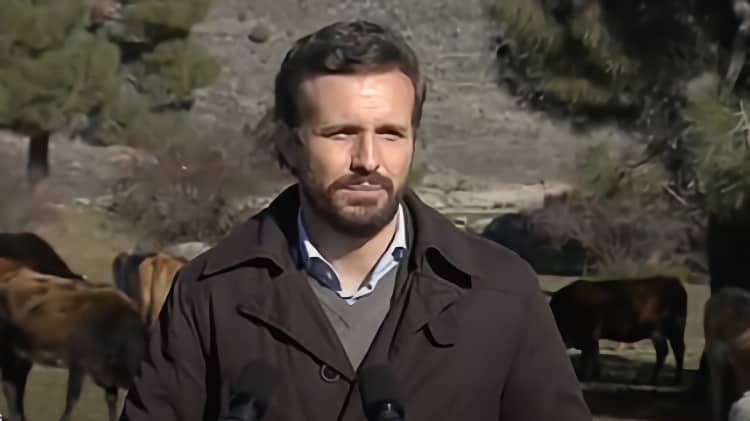Ángel Collado
The Partido Popular (People’s Party) is regrouping in the opposition and even taking the political initiative with its offensive against the arbitrariness of the Government in the distribution of European funds plus the campaign for the regional elections in Castile and Leon on 13 February.
After the internal crisis with which he closed the year with his attempt to stop the career of Isabel Díaz Ayuso, Pablo Casado is taking advantage of the next appointment before the polls to unsettle Pedro Sánchez with the exploitation of the show given by the communist sector of the Government, this time by the minister Alberto Garzón against the livestock sector.
In addition, he is counting on the protests against the grievances created by the Moncloa Palace in autonomous communities and town councils with the government’s handling of the 70,000 million euros in aid coming from Brussels.
Pending these funds, which hold the key to his permanence in power, the head of the Executive was now focused on validating in Congress his decree for the mini-reform of labour legislation, which in turn was an EU demand to keep the funding tap open. Sánchez, from decree to decree and always outside the ordinary parliamentary process, controls directly from his cabinet the distribution of this aid by projects and regions, and does so outside any independent body or experts involved in the decision-making process, as is the case in other European countries.
The president of the government enjoys this extraordinary procedure of “hand-picked” distribution because, in the end, the resulting decree was validated in Congress in January last year thanks to the abstention of the extreme right-wing group represented by Vox.
The Community of Madrid has been the first to appeal to the courts, specifically to the Supreme Court, against the decree that has allowed the central government to allocate 9 million euros for the promotion of employment in four regions: Basque Country, Navarre, Valencian Community and Extremadura. It turns out that all four are controlled by the PSOE and its nationalist partners, and according to Isabel Díaz Ayuso’s team, the distribution was made with “sectarian and partisan criteria”.
The PP fears that this case of lack of transparency and consensus in the distribution of funds could become generalised. The other regional governments which are PP presidents such as those of Andalusia (Juan Manuel Moreno), Galicia (Alberto Núñez Feijóo) Castilla y León (Alfonso Fernández Mañueco) and Murcia (Fernando López Miras) are already considering or threatening to follow in the same footsteps as Díaz Ayuso.
In addition, 138 PP mayors of cities with more than 25,000 inhabitants are coordinating their legal actions because they consider that the Government is harming the interests of their cities.
To this institutional rebellion of the PP against the management of La Moncloa in the distribution of aid, Pablo Casado, as head of the opposition, has announced that he will take the campaign against Sánchez in this matter “to the end”. And that end consists of transferring the battle for the funds, in parallel with the judicial process in Spain, to the EU institutions themselves, denouncing that they are “handpicked”, without criteria of efficiency or transparency, to the point of threatening a massive sowing of corruption.
The PP’s offensive has unleashed the wrath of Sánchez, who has now turned to accusing the opposition of a lack of patriotism and of jeopardising the arrival of aid to Spain in order to wear down his government.
This open front of conflict for the government comes together with the campaign for the imminent regional elections in Castilla y León, which could not have started worse for the interests of the PSOE due to the attacks of the minister Alberto Garzón against an economic sector, agriculture and livestock, which is key in the region.
For days, the PP has been exploiting the internal division in the social-communist government over the statements made by the Minister of Consumption about the quality of the meat that leaves Spain, while in La Moncloa they have not managed to put a stop to a crisis that leaves evidence of Pedro Sánchez’s mortgages with the populist party founded by Pablo Iglesias.
The head of the Executive, without the authority to dismiss or make a minister of the communist party rectify his position, limits himself to waiting for the storm to pass, even if the polls sink his electoral forecasts and benefit the aspirations of the PP to get closer to an absolute majority in Castilla y León.
As in the case of the decree on personal control over European aid, Sánchez has all his hopes pinned on Vox. This time, he hopes that the foreseeable rise of the extreme right will be such that it will leave a future government of the PP in the hands of Santiago Abascal’s party and thus try to disguise the fact that it will not be able to win a majority in Castilla y León.







